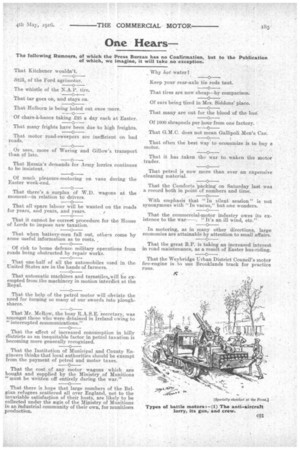One Hears
Page 3

If you've noticed an error in this article please click here to report it so we can fix it.
The following Rumours, of which the Press Bureau has no Confirmation, but to the Publication of which, we imagine, it will take no exception.
That Kitchener wouldn't. Still, of the Ford agrimotor.
The whistle of the N.A.P. tire. That tar goes on, and stays on.
That' Holborn is being holed out once more.
Of chars-&-banes taking 225 a day each at Easter.
That many frights have been due to high freights.
That motor road-sweepers are inefficient on bad roads.' • Or sees, more of Waring and Gillow's transport than of late.
That Russia's demands for Army lorries continues to be insistent.
Of much pleasure-motoring on vans during the Easter week-end.
That there's a surplus of W.D. wagons at the moment—in relation to drivers.
That all spare labour will be wanted on the roads for years, and years, and years. s That it cannot be correet procedure for the House of Lords to impose new taxation.
That when battery-men fall out, others come by some useful information as to costs.
Of risk to home defence military operations from roads being obstructed by repair works.
That one-half of all the automobiles used in the United States are in the hands of farmers.
That automatic machines and turnstilewill be exempted from the machinery in motion interdict at the Royal.
That the help of the petrol motor will obviate the need for turning so many of our swords into ploughshares.
That Mr. Mellow, the busy R.A. &E. secretary, was amongst those who were detained in Ireland owing to "interrupted communications."
That the e.ffect of increased consumption in hilly districts as an inequitable factor in petrol taxation is becoming more generally recognized.
That the Institution of Municipal and County Engineers thinks that local authorities should be exempt from the payment of petrol and motor taxes.
That the cost of any inotor wagons which are bought and supplied by the Ministry of Munitions "must be written off entirely during the war."
That there is hope that large numbers of the Belgian refugees scattered all over. England. not to the invariable satisfaction of their hosts, are likely to be collected under the mgis of the Ministry of Munitions in an industrial community of their own, for munitions production. Why hot water Keep your rear-axle tie rods taut.
That tires are now cheap—by comparison.
Of cars being tired in Mrs. Siddons' place.
That many are out for the blood of the bus': Of 1000 shrapnels per hour from one factory.
That G.M, C. does not mean Gallipoli Men's Car.
That often the best way to economize is to buy a motor.
That it has: taken the war to waken the motor trader.
That petrol is now more than ever an expensive cleaning material.
That the Comforts `packingon Saturday last was a record both in point of nunThers and time.
With emphasis that "In n silent session" is not synonymous with "In vacuo," but one wonders.
That the commercial-motor industry owes its existence to the war—. "It's an ill wind, etc."
In motoring, as in many other directions, large economies are attainable by attention to small affairs.
That the great B.P. is taking an increased interest in read maintenance, as a result of Easter bus-riding.
That the Weybridge Urban District Council's motor fire-engine is to use Brooklands track for practice runs.




















